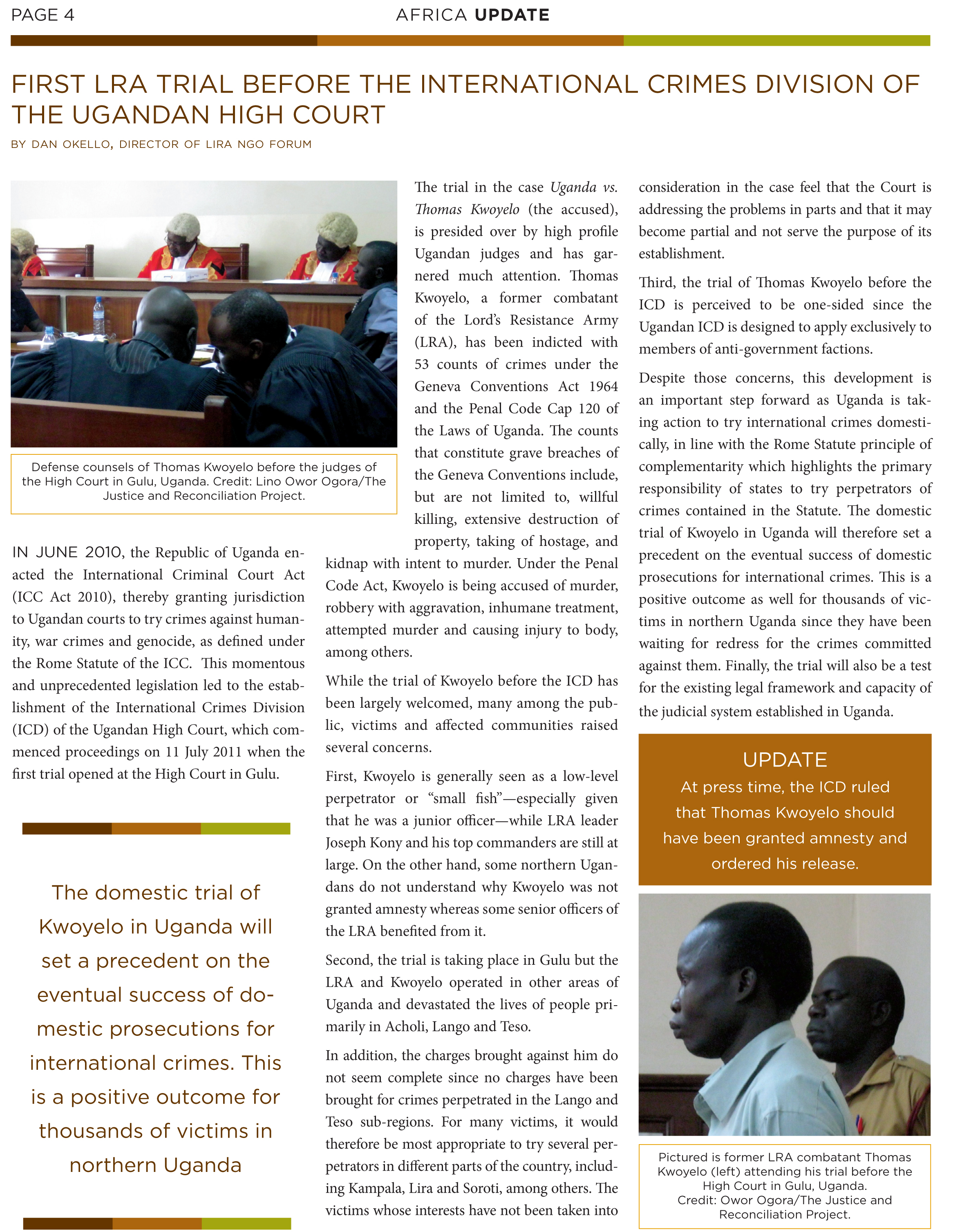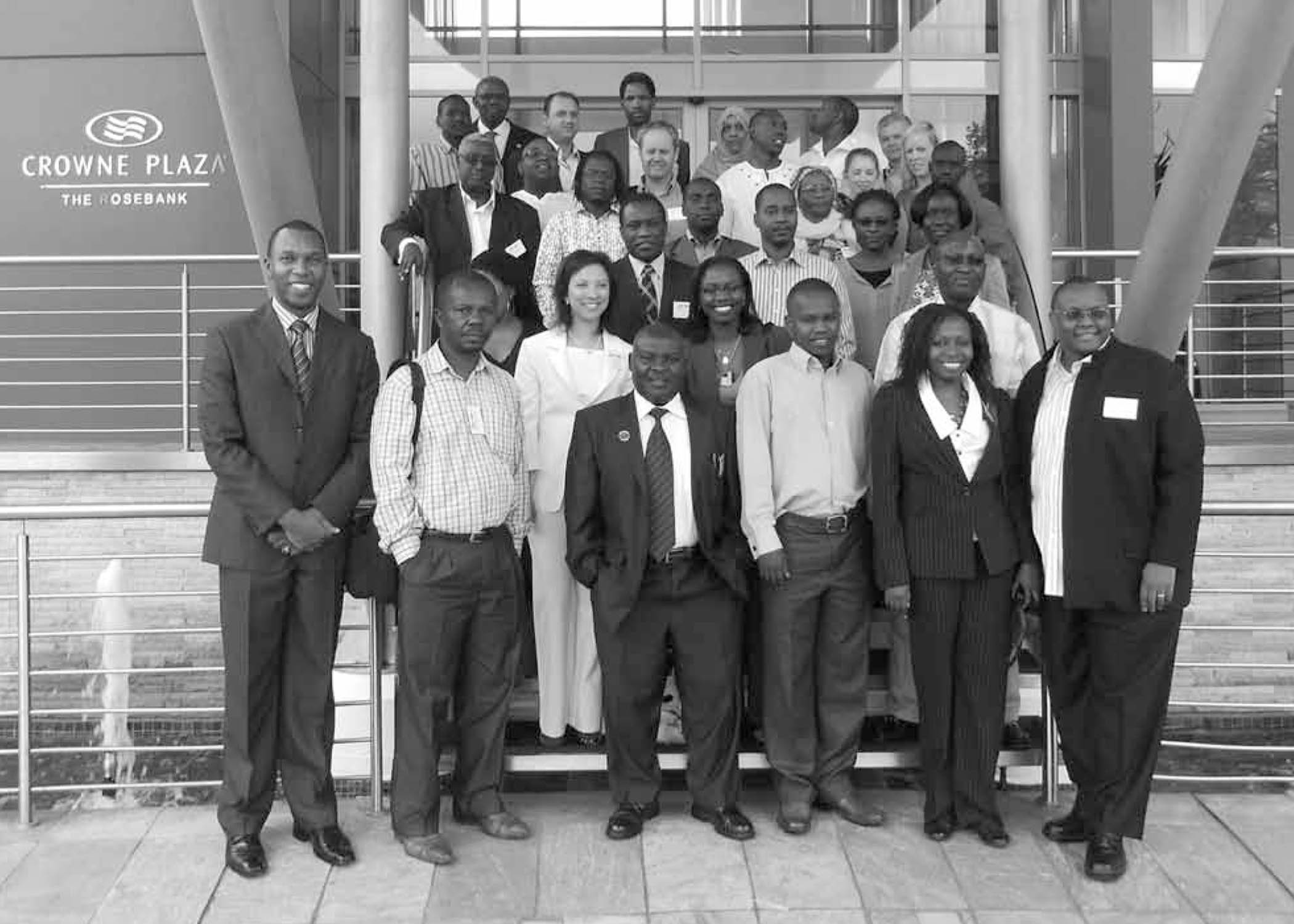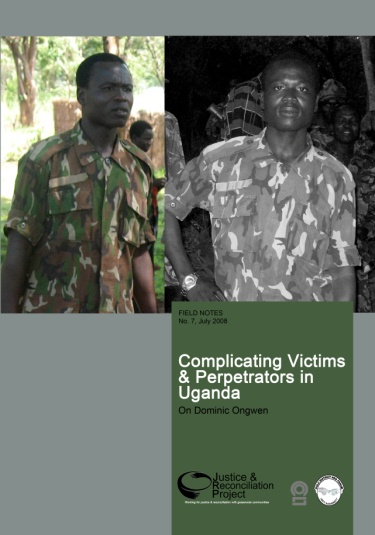TJ Monitor

Last month, we blogged about former Lord’s Resistance Army (LRA) Commander Dominic Ongwen’s first appearance at the International Criminal Court (ICC) for war crimes and crimes against humanity. As part of our TJ Monitor, we will be giving updates on the case and other related proceedings.
Non-redacted warrant of arrest reveals Ongwen was charged with leading Lukodi massacre
On 28 January, the ICC reclassified its warrant of arrest for Dominic Ongwen its public. Previously, the warrant indicated that Ongwen was charged with seven counts of war crimes and crimes against humanity under the Rome Statute for leading a massacre in 2004 on an unnamed internally displaced persons (IDP) camp in northern Uganda. Following Ongwen’s surrender and transfer to The Hague, the redactions on the warrant were removed, revealing that the attack Ongwen is alleged to have led was on an IDP camp in Lukodi, a village 17 kilometres from Gulu town, on 19 May 2004.
In 2011, the Justice and Reconciliation Project documented the experiences of survivors of what has come to be known as the Lukodi massacre. According to witnesses to the massacre, including formerly abducted persons with insight into the workings of the rebel group, the LRA attacked the camp as an act of revenge on Lukodi’s residents because they believed they were collaborating with the government in its fight against the rebels. Respondents also said that the massacre was led by an LRA commander called “Tulu”.
Following the massacre, hasty burials were carried out in shallow graves for the approximately 60 people that died. Exhumations of the bodies were also reported to have been conducted by government officials, apparently as a response to ongoing investigations related to Uganda’s referral of the LRA situation to the ICC in 2003.
Ongwen’s case separated from other LRA top commanders
On 6 February, Single Judge Ekatarena Trendafilova, who is presiding over the Pre-Trial Chamber, severed Ongwen’s case from the charges levelled against the other top LRA commanders indicted by the ICC, Joseph Kony, Vincent Otti and Okot Odhiambo, who are still “at large”. This means that Ongwen’s case will go ahead independently of the other commanders’.
This decision was rendered on the basis that pursuing the charges against all four would “bring about serious prejudice to Mr. Ongwen as it has the potential of prolonging the pre-trial proceedings against him”. In addition, the Judge ordered that the case be assigned a new case number, and all documents and decisions rendered in relation to it be assigned to its new case record.
Prosecution applies for the postponement of confirmation of charges
Last Thursday, the Office of the Prosecutor applied to the Pre-Trial Chamber for Dominic Ongwen’s confirmation of charges hearing to be rescheduled to 31 January 2016 for several reasons, including the need to provide time for the prosecution to renew contact with its witnesses and assess their “security situation”. The provisional date for the confirmation of charges hearing was originally set for 24 August 2015 during Ongwen’s initial appearance hearing in January.
|
The confirmation of charges hearing |
|---|
|
This hearing will be held by the Pre-Trial Chamber to confirm the charges on which the Prosecutor intends to seek trial. At the hearing, the Prosecutor presents evidence to support each charge leveled against the accused in order to establish “substantial grounds to believe” that he or she committed the crimes charged. The accused may in response object to the charges, challenge the evidence presented by the Prosecutor and present evidence. The Pre-Trial Chamber will then confirm the charges in relation to which it has determined that there is sufficient evidence and commit the accused to the Trial Chamber for trial. |
In terms of Article 67 (2) of the Rome Statute, the Prosecutor is obliged to disclose evidence to the defence which may she believes will show Dominic Ongwen’s, as the accused, innocence, mitigate his guilt or affect the credibility of the prosecution evidence during the trial. In order to do this, the prosecution argued that there was a need to review up to 94,000 pages of its existing evidence given the years of dormancy the case has had. Additionally, the prosecution says it will have to renew contact with its 32 existing witnesses regarding their statements and assess their security, which it suggested would take till at least 7 April 2015. Following this, 140 additional witnesses would also possibly be interviewed, depending on whether their statements are assessed to be disclosable in terms of Article 67.
Other reasons cited for additional time to by the prosecution, was because they would need to apply for redactions of prosecution evidence, witness assessments and other items related to the case by at least 8 May. They would also need to conduct re-investigations and, possibly, additional investigations into the case, as well as transcribe, translate and analyse up text and audio interviews, some of which could take from four to five months. The prosecution also suggested considering adding new charges against Ongwen was also a factor which would require extra time beyond August.
Following this application, the Single Judge will render a decision after considering the request and ascertaining the views of the defense.
Dominic Ongwen Case Timeline
| 26 January 2015 | Dominic Ongwen’s initial appearance hearing at held at the ICC |
| 29 January | ICC warrant of arrest for Dominic Ongwen re-classified as public. |
| 12 February | The Office of the Prosecutor submits an application for the postponement of Dominic Ongwen’s confirmation of charges hearing from 24 August 2015 to 31 January 2015. |
| 7 April | The date by which the prosecution suggests the security assessment of its witnesses would be complete |
| 8 May | The date by which the prosecution expects to complete its applications for redactions for items in its possession relating to its 32 witnesses. |
| 24 August | Provisional date set for the confirmation of charges hearing |
| 31 January 2016 | Proposed date for the confirmation of charges hearing |





